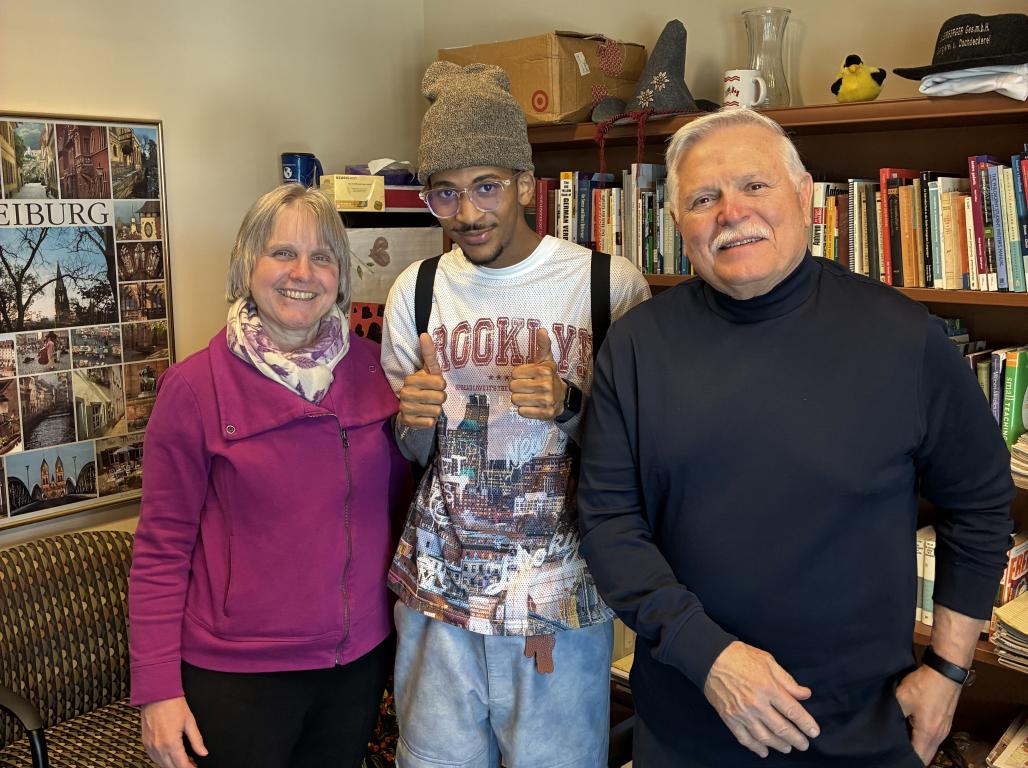Kristie Houck plans to build on the work of her predecessor, Master of Public Policy and Administration Scholar Ashley Hines, in examining causes of and finding solutions to housing issues in York City.
As a dedicated advocate for at-risk youth and equitable housing, Kristie Houck is determined to make a difference in York City. She is the new Master of Public Policy and Administration (MPPA) Scholar-in-Residence at York College of Pennsylvania.
Houck will serve a two-year research residency with the Gunter-Smith Center for Community Engagement’s Urban Collaborative, an initiative focused on advancing equitable housing policies and practices in the city.
A path to public policy
Houck brings to her new role a rich background of experience and passion. The 2022 graduate of Lebanon Valley College, with a bachelor’s degree in Psychology, has participated in various research projects during her academic career. One notable endeavor involved a community-based project that introduced her to the challenges faced by at-risk youth in the Children and Youth Services and Juvenile Probation systems in Lebanon County.
For more than three years, Houck worked with children through the Youth Advocate Programs (YAP), connecting with them and their families and gaining a broad understanding of the community services offered.
“It's not always a fun job; there’s definitely secondhand trauma,” Houck says. “But it’s a good experience to have for someone interested in going into policymaking.”
Inspired by the stories of individuals she encountered through YAP, Houck decided to study public policy at the graduate level. She saw firsthand how existing systems often fail at-risk youth, leaving them without proper support as they transition into adulthood. Some youth face housing struggles, even homelessness, and the system frequently lacks effective policies to address these complex issues.
As an MPPA Scholar-in-Residence, Houck aspires to make a lasting impact on the lives of vulnerable individuals and communities. She envisions a future where her research informs policy decisions and helps to create solutions to the root causes of issues such as housing inequality. Working with at-risk youth has given her valuable insight into the gaps in the system that need urgent attention.
Bringing her experience to the Urban Collaborative
The Scholar-in-Residence program at York College allows exceptional students such as Houck to pursue a master’s degree while gaining practical experience in community research. Houck’s role will allow her to conduct research and craft reports on public policy issues that the York community faces, while completing her graduate studies.
Her focus for the Fall 2023 semester centers on identifying municipalities that are similar to York and studying their approaches to providing affordable housing. She will examine factors such as population, income, eviction rates, and housing assistance. Houck is particularly interested in innovative solutions, such as the conversion of cargo storage bins into tiny homes, a creative way to address housing challenges.
Crucial to her work is the inclusion of local voices in the policymaking process. Instead of relying solely on preconceived notions, she believes in creating policies with the help of the people impacted by them. This approach ensures that policies are tailored to the specific needs of the community, leading to more effective and sustainable outcomes. Houck hopes she can help pave the way for a future in which equitable housing is a reality for all.
“I hope this is something where I can make a bigger impact,” she says. “It’s good to make an impact in individual families’ lives, but I’d like to make a bigger impact, especially on housing. I really want to make a difference and I want it to be a well-informed one.”
A devastating effect
Houck follows in the footsteps of York College’s first MPPA Scholar-in-Residence, Ashley Hines ’23. Hines spent two years studying York City and getting to know its residents, focusing on issues related to poverty, housing insecurity, and the juncture of the public, private, and nonprofit sectors. Her research led her to an important finding: Green spaces are crucial for the health and well-being of residents in low-income neighborhoods.
Hines found that many of those neighborhoods lack green spaces such as parks or community gardens. This deficiency can have a significant impact on the health of residents, as spending time in nature has been shown to reduce stress, lower blood pressure, and improve overall mental health.
“It’s not something that only high-income areas need,” says Hines. “The fact that these neighborhoods haven’t been getting that investment is really devastating and impacting the health of people living in these neighborhoods.”
Quality of life without displacement
The policy-driven solution isn’t as simple as adding green spaces. Hines’ research revealed that when officials create green spaces in low-income neighborhoods without the input of residents, the result can be gentrification, an increase in property values, and displacement.
Hines discovered an interesting concept called “just green enough spaces,” which involves adding beauty without changing the culture of a neighborhood. This can be achieved by creating murals or community gardens and having neighborhood cleanups, improving the infrastructure just enough to raise the quality of life without increasing property values too much.
Her impact will go even further thanks to recently being hired as a prestigious William and Hannah Penn Fellow by the Pennsylvania Office of Administration. She was one of 14 Fellows hired into the two-year program that brings fresh ideas from the best and brightest minds to serve in Commonwealth agencies and work on specific policy projects.
By focusing on the needs of low-income neighborhoods, Hines demonstrated and Houck will reinforce the concept that employing research and community dialogue can enhance the health and well-being of York City residents.





